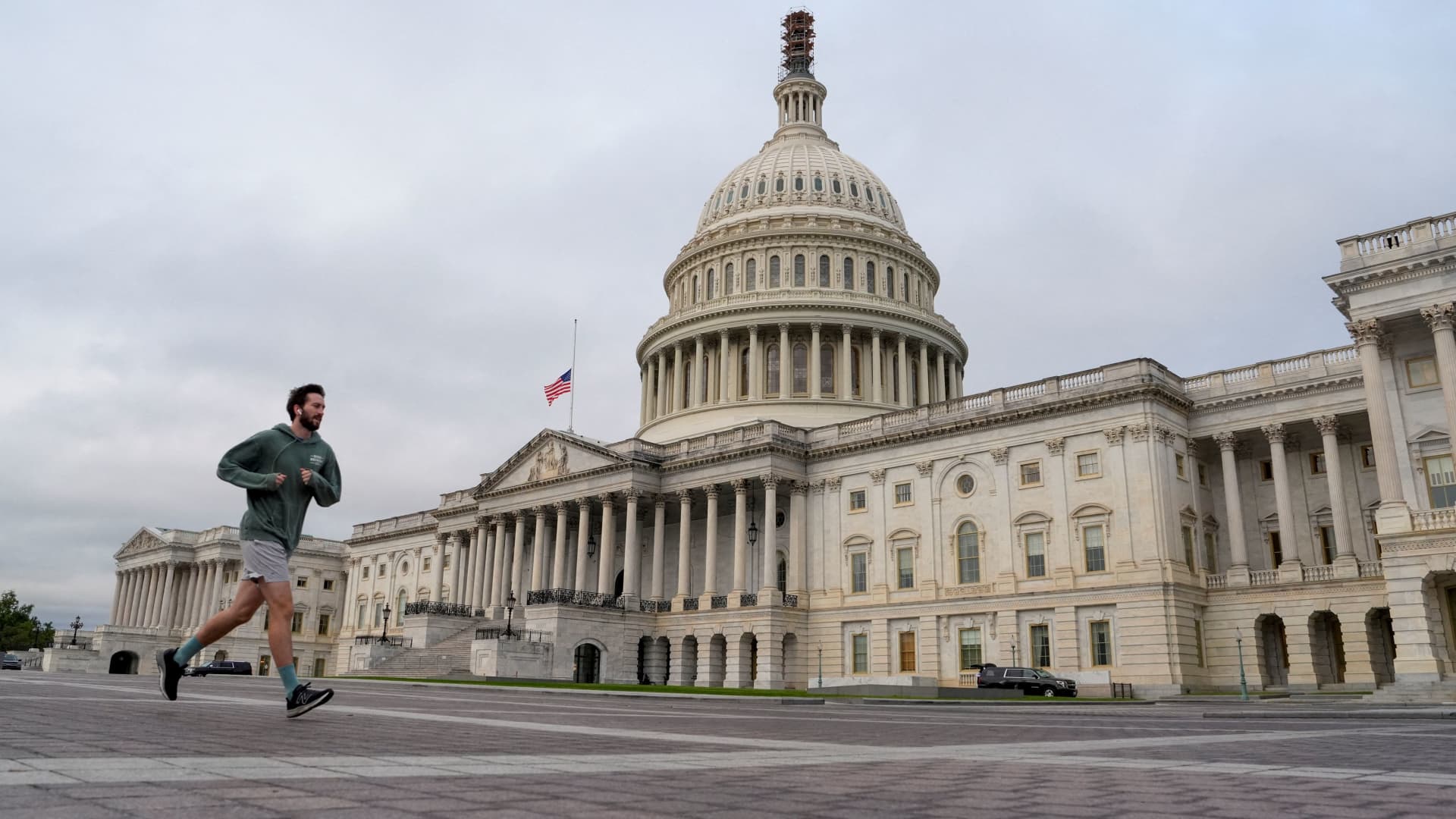A jogger runs by the U.S. Capitol as the deadline to avert a partial government shutdown approaches at the end of the day on Capitol Hill in Washington, U.S., September 30, 2023.
Ken Cedeno | Reuters
Congressional leaders announced a $1.59 trillion deal on top-line spending Sunday as the government races to avoid a potential shutdown.
The deal establishes an overall spending budget of $1.59 trillion for the 2024 fiscal year, allocating $886 billion to military spending and $704 billion for non-defense spending, said Republican House Speaker Mike Johnson of Louisiana said in a Sunday note.
“After many weeks of dialogue and debate, we have secured hard-fought concessions to unlock the FY 24 topline numbers and allow the Appropriations Committee to finally begin negotiating and completing the twelve annual appropriations bills,” he wrote.
The deal comes as the House and Senate inch closer to a key Jan.19 deadline, when funding runs out for many federal agencies. Funding for the rest of the government expires on Feb. 2.
While the deal paves the way for a potential funding decision, and signals that both Johnson and Senate Majority Leader Chuck Schumer (D-N.Y.) are working in unison, a shutdown isn’t out of the question as parties continue to clash over key policy issues.
“”The framework agreement to proceed will enable the appropriators to address many of the major challenges America faces at home and abroad,” wrote Schumer and House Minority Leader Hakeem Jeffries (D-N.Y.) in a Sunday letter. “It will also allow us to keep the investments for hardworking American families secured by the legislative achievements of President Biden and Congressional Democrats.”
Johnson acknowledged that the spending levels would “not satisfy” all parties, or cut as much as many had hoped for, but offers a way to “move the process forward; 2) reprioritize funding within the topline towards conservative objectives, instead of last year’s Schumer-Pelosi omnibus; and 3) fight for the important policy riders included in our House FY24 bills.”
Some of the concessions made include a $10-billion cut to IRS mandatory funding under the Inflation Reduction Act and $6.1 billion of the “COVID-era slush funds.”
In a separate statement, Schumer and Jeffries said the deal allocates $772.7 billion toward non-defense discretionary funding, aimed at safeguarding “key domestic priorities like veterans benefits, health care and nutrition assistance from the draconian cuts sought by right-wing extremists.”
The coming weeks represent the first major test of Johnson’s ability to govern as speaker. They come after a year during which the GOP-controlled House passed just 27 bills that became laws. This number reflects a historically unproductive rate, halfway through the 118th Congress.
And Johnson’s task is complicated by a shrinking majority.
Louisiana Republican House Majority Leader Steve Scalise’s absence from Washington shrinks the GOP margin to just one vote, meaning any spending deal will require Democratic votes. This makes it nearly impossible for House Republicans to pass government spending bills along party lines because hardliners in the caucus are all but assured to oppose anything that does not contain drastic cuts.
Scalise’s absence follows the ousting of GOP Rep. George Santos of New York late last year, and the departure of Johnson’s predecessor, Former House Speaker Kevin McCarthy of California, whose resignation was effective Dec. 31.
In a statement released Sunday, President Biden seemed to approve of the deal, and the progress it makes toward averting a shutdown while taking into account funding levels negotiated last year.
“Now, congressional Republicans must do their job, stop threatening to shut down the government, and fulfill their basic responsibility to fund critical domestic and national security priorities, including my supplemental request,” he said. “It’s time for them to act. “






